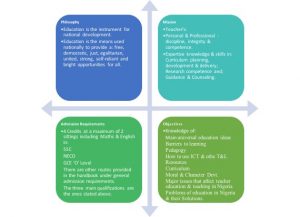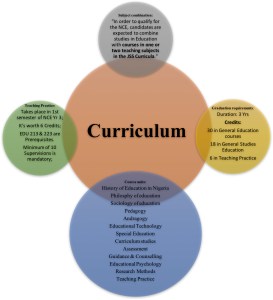
The NCE…aims at producing teachers with high personal and professional discipline and integrity, teachers who are dedicated, with appropriate knowledge, skills and attitudes that would facilitate easy achievement of the national goals…
There has been so much talk on the quality of ‘teachers’ in the Nigerian education sector, with with the most recent saga in the nation’s compulsory education sector being the issue between the Kaduna state government and 22,000 teachers that were sacked by the government as a result of their inability to pass a ‘Primary 4’ graded test.
In order to highlight some of the fundamental issues in teacher education in the nation, I decided to breakdown the essential provisions of the Federal Government’s current teacher education handbook – Nigeria Certificate of Education (NCE): Minimum Standards for General Education Courses (2012). The handbook acts as the statutory guideline on the curriculum and admissions criteria into any NCE programme – “which is the recognised minimum teaching qualification in Nigeria” (p.6).
The NCE “is to produce quality teachers for the Basic Education sub-sector.” This sub-sector encompasses:
- Pre-Primary Education or Early Childhood & Care Education
- Primary Education
- Junior Secondary Education
- Adult and Non-Formal Education
- Special Needs Education

From the course curriculum breakdown above an NCE trainee would have gone through the 3 years’ programme with only a 3 months’ worth of classroom teaching practice experience in the training programme’s final session. Likewise, trainees are expected to be trained to be able to deliver teaching at the Junior Secondary School level, irrespective of the fact that some of the trainees might actually be interested in teaching at the early years’ stage or primary level. More importantly, there is the issue of the differences in the National curriculum provisions for early years, primary and junior secondary school education in the country. Hence, it would be expected that trainee teachers on the NCE programme should be made to specialise in the curriculum level that they intend to work in. Also, there is the subtle issue of the requisite skills, knowledge and understanding that are specifically needed in working in different educational settings with regards to children’s age. Furthermore, the curriculum in its course units’ provision attempts to be as abroad as possible in what it covers but thin on providing real depths to trainees in any specific area of education studies. Hence, much attention is not given in the curriculum on issues like ethics, values and beliefs and the important roles they play in teachers’ professional practice.
Another fundamental issue with the curriculum is that two lecture room based course units – EDU 213 (Micro-teaching theory) and EDU 223 (Micro-teaching Practicum) – serve as prerequisites courses for trainees to be able to go on the mandatory 3 months teaching practice (classroom based teaching experience) in the final year of the programme, this is coupled with fact that trainees are expected to undergo a minimum of 10 supervisions within those three months – that is equivalent to having a classroom observation of a trainee’s classroom teaching once every week throughout the 3 months of the teaching practice. Perhaps, allocating more time for the teaching practice with better staggered supervisions will be more beneficial to the NCE and the trainees being able to fulfil the training criteria, as well as develop their teaching skills and knowledge. A teacher training programme like the NCE should be able to offer a streamlined course offer in the ratio of 60% (Theory) to 40% (Practice) at the bare minimum.
Lastly, it is to be noted that the basic admission requirement into the NCE programme is probably the lowest – 4 Credits at GCE O-Level in 2 sittings including Maths and English – of any admission requirement at the higher education level in the country. And lest I forget, the document is still focused on the attainment of UN’s Millennium Development Goals (MDGs) in an era of Sustainable Development Goals (SDGs).
*All quotes and bullet points are fromNigeria Certificate of Education (NCE): Minimum Standards for General Education Courses (2012).
Are/were you a lecturer/student on an NCE programme? What do you think about this post? Please, leave your thoughts on this post in the comment section below, and feel free to share the article with your contacts.
Thanks for taking out of your precious time to read my article/s!